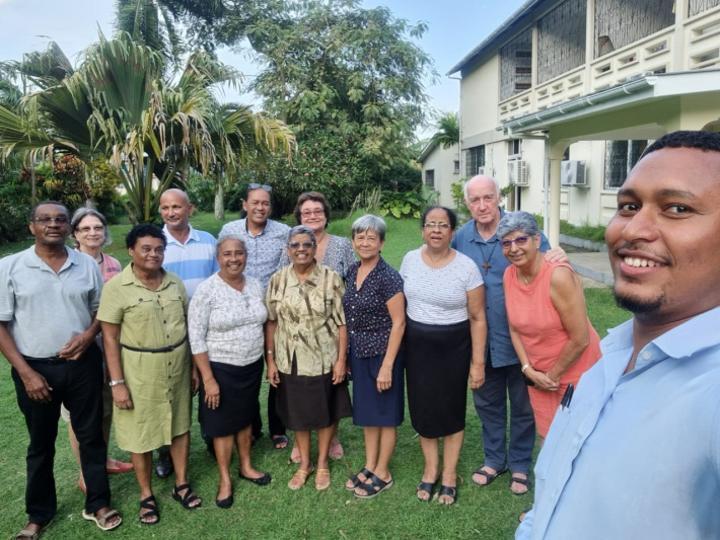Africa-Press – Seychelles. And yes, after 15 years and five months of service in the Seychelles, Sister Marie Alice Vivien of the Sisters of Saint-Joseph de Cluny leaves the Seychelles to return to her mother house in France. Today, present in 56 countries, the sisters of Saint Joseph of Cluny come from around 60 nations or regions; more than a third of them are Indian, almost a fifth African and Malagasy.
With a great diversity of languages, cultures and formation, with a wide range of apostolic commitments which evolve according to the calls of the times, the unity of the congregation is maintained by the desire of each sister to live the following of Christ according to the spirit of the founder.
Before leaving, Seychelles NATION was able to meet Sister Alice for one last conversation.
Seychelles NATION: Introduce yourself to our readers?
Sister Alice: I am Sister Marie Alice Vivien, nun of the Saint Joseph Sisters of Cluny, and I am better known as Sister Alice. Born in Mauritius, I completed all my studies from primary to secondary there. Then, I embarked on a career as a primary school teacher in Mauritius. In 1967, I decided to become a nun. I was looking for a congregation, and that’s when I came across the Saint Joseph Sisters of Cluny. I submitted my application to Paris and received a positive response. Then, I returned to France, where I followed all my religious training. I also studied in Ireland, thus being part of the province of France.
I also continued my university studies in France. Subsequently, I accomplished several missions, starting with Reunion Island (7 years). During my stay, I fell ill and had to return to France for treatment. After my convalescence, I went to French Guiana for 12 years. I also got sick there, then I left for Papua New Guinea. Throughout my missions, I have always been a teacher. In Reunion, I taught at secondary level, in French Guiana, I was a school director and also head of school in Papua New Guinea. This last mission was quite difficult because there was no transportation, and everything arrived by plane for us. There were almost 200 boarders, as the young people walked to school and stayed with us for the whole term.
Seychelles NATION: What brought you to Seychelles?
Sister Alice: As we say in religious language, it’s obedience. I was sent to the island of Reunion, which is close to Mauritius, and even to go to French Guiana, there was a need. Following a pressing request, I requested a mission to Papua New Guinea. At the age of 60, I left Papua to return to France. After a year, the Main Mother told me that I had to go to the Seychelles. I was dazed, because I thought that the Seychelles was a country without big problems and also that it was a vacation spot for the rich. This is how on July 16, 2008, I arrived in Seychelles.
Seychelles NATION: What was your mission in Seychelles?
Sister Alice: When I arrived, I looked at existing programs in the congregation. I started teaching classes on leadership, anger, stress, forgiveness, etc. Having trained in counseling in England, I also began supporting couples and individuals with moral, spiritual and psychological problems.
I have also trained other facilitators so that they can offer the same service. I was a member of the La Rosière Reception Center, where I worked with alcoholics accompanied by their families (parents or spouses) to change their lives and find their place in society. We also worked with drug addicts, individually or at the rehabilitation center.
I have been a member of the Seychelles Interfaith Council and have been part of other organizations and committees. Recently, I was often called upon to teach leadership courses in schools.
Seychelles NATION: Tell us some anecdotes that marked you in Seychelles?
Sister Alice: The reality that I realized is that a young person must take it upon themselves to get out of their addiction, and the young person must be followed. We must help the young person find out what pushed him to take drugs. I used this method here, and I’m glad I was able to help others, which gives me great satisfaction. Support for these people is essential, because the risk of relapse is present. I have worked with many couples, and I was struck by the desire they had to stay together despite the difficulties.
There are many good things,
For More News And Analysis About Seychelles Follow Africa-Press






